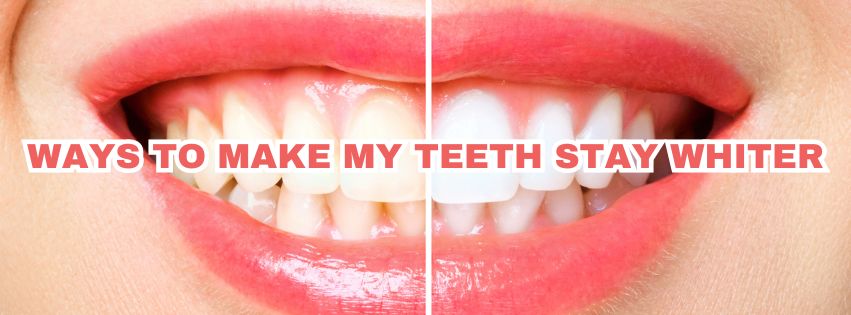Keep your teeth white by brushing twice a day with a whitening toothpaste and flossing to remove plaque. Minimize the consumption of foods and drinks that cause stains, such as coffee and red wine. Regular dental check-ups, professional cleanings, and staying away from tobacco also help maintain a brighter smile. You can also try whitening strips or talk to your dentist for tailored recommendations.
What can I do to keep my teeth white consistently?
Keep your teeth white by maintaining good oral hygiene, including regular brushing and flossing, using whitening toothpaste, and visiting the dentist for check-ups. Reduce your intake of foods that cause stains, avoid smoking, and consider whitening touch-ups like strips or professional treatments with your dentist’s guidance.
Can yellow teeth be whitened?
Yes, yellow teeth can usually be brightened. Brushing with whitening toothpaste, avoiding stain-causing foods, and regular dental cleanings can help improve their appearance. You can also try whitening treatments, such as strips or professional options. It’s a good idea to ask your dentist for specific advice.
To achieve a brighter, whiter smile, consider these steps:
- Brush twice daily with a whitening toothpaste.
- Floss regularly to remove plaque and food particles.
- Limit consumption of stain-causing foods and drinks (e.g., coffee, red wine).
- Avoid smoking or tobacco use, which can cause yellowing.
- Schedule regular dental cleanings for professional plaque and stain removal.
- Try at-home whitening strips or gels.
- Consider professional whitening treatments from your dentist for more dramatic results.
- Consult your dentist for personalized advice and recommendations.
What whitens teeth fast?
Keep in mind that results from teeth-whitening methods can vary, so it’s best to consult a dentist before starting any treatment. Here are some common options:
- Whitening Toothpaste: Specially formulated to remove surface stains with abrasives or chemicals.
- Over-the-Counter Whitening Strips and Gels: Typically contain peroxide for whitening. Follow directions carefully to avoid sensitivity.
- Professional Teeth Whitening: Dentists use stronger bleaching agents for in-office treatments, offering more effective but costlier results.
- Oil Pulling: A traditional method using coconut oil swished in the mouth, though scientific support is limited.
- Baking Soda: Some people brush with a paste made from baking soda and water. Its mild abrasiveness may help lift surface stains.
- Limit Stain-Causing Foods and Drinks: Reducing intake of coffee, tea, and red wine can help maintain a whiter smile.
Always focus on maintaining good oral health and seek a dentist’s advice for the best approach based on your specific needs.
Do whitening strips really work?
Yes, whitening strips can effectively reduce surface stains on teeth by using peroxide to bleach the enamel. They are particularly effective for stains from coffee or smoking, but may be less useful for more stubborn, deep stains. To achieve the best results, it’s important to use the strips consistently, follow the instructions carefully, and be mindful of potential tooth sensitivity. Since results can vary, it’s a good idea to consult with a dentist, especially if you have sensitive teeth or want more noticeable whitening. Also, maintaining good oral hygiene is essential for overall dental health.
How long does it take for baking soda to whiten teeth?
Baking soda acts as a natural bleaching agent to help remove stains from teeth. The time it takes to see results can vary depending on the severity of the stains. Generally, noticeable improvements can be seen after about two weeks of daily use. Consistent application is crucial for achieving effective whitening, though individual results may differ.
Does Vaseline whiten teeth?
Vaseline does not whiten teeth. Instead, some people use a thin layer of petroleum jelly as a protective barrier. It can help shield teeth from stains caused by certain foods and drinks, particularly after whitening treatments. Additionally, it can prevent lipstick from transferring onto your teeth. While it doesn’t directly whiten your teeth, it can help maintain a brighter smile by reducing potential staining.
If you’re not achieving the desired whitening results, it’s best to consult a dentist. They can evaluate the underlying reasons for the lack of improvement and suggest appropriate whitening treatments or other solutions tailored to your dental health.

